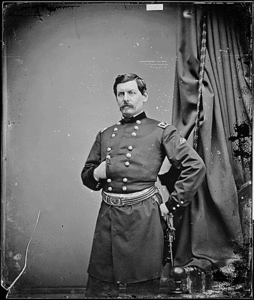- Joined
- May 12, 2019
- Messages
- 3,690
- Reaction score
- 2,296
A simple notation in a timeline of the Civil War: On June 28, 1865 the Army Of The Potomac was disbanded.
Here is a snip from a New York Times article:
To put the accomplishments of the Army of the Potomac into perspective, perhaps it is fitting to go back to an article run in The New York Times as Grant accepted the surrender of Lee. The unidentified author—perhaps William Swinton—summarized the career of the “The Grand Old Army of the Potomac.” That Union army “has done its work. It has captured Richmond, it has demolished Lee. Its unparalleled trials have been rewarded by unparalleled success.” From its organization during the summer of 1861, the Army of the Potomac “has always occupied the foreground of the war, and all brilliant exploits elsewhere could but momentarily draw the public eye from it. Everybody felt that on its strong right arm mainly depended the fate of the nation.” McClellan, Burnside, and Hooker would not go into the history books as war-winning generals. However, whatever “may have been the defects of its former commanders, it is certain that the rank and file of the army have never been wanting.” Other Union armies also had won great battlefield victories. Yet the Army of the Potomac “ought always to be remembered as the army that was pitted against the very head and front of the rebellion, and that sent it finally to dust. Every living man who has faithfully served in that army deserves unfading laurels. And would that every one of the tens of thousands of its heroic dead could have a monument as perdurable as the republic.”
And another from the Encyclopedia of Virginia:
The Army of the Potomac endured some of the most devastating and humiliating defeats in the history of American arms, yet it never relinquished its quest for ultimate victory. By prevailing over a formidable foe despite political pressure and both uninspired and incompetent leadership, the army came to epitomize tenacity and perseverance. Its long-suffering troops fervently hoped that history would grant them these accolades. As one of its enlisted men observed midway through the war, "It is actually wonderful how the Army of the Potomac stand the deprivations, trials, & reverses that have been heaped on them without stint or mercy to meet the foe with undaunted spirits. … I look forward to the time when a man can say with pride, 'I belonged to the Army of the Potomac'." That day finally came on April 9, 1865.
Here is a snip from a New York Times article:
To put the accomplishments of the Army of the Potomac into perspective, perhaps it is fitting to go back to an article run in The New York Times as Grant accepted the surrender of Lee. The unidentified author—perhaps William Swinton—summarized the career of the “The Grand Old Army of the Potomac.” That Union army “has done its work. It has captured Richmond, it has demolished Lee. Its unparalleled trials have been rewarded by unparalleled success.” From its organization during the summer of 1861, the Army of the Potomac “has always occupied the foreground of the war, and all brilliant exploits elsewhere could but momentarily draw the public eye from it. Everybody felt that on its strong right arm mainly depended the fate of the nation.” McClellan, Burnside, and Hooker would not go into the history books as war-winning generals. However, whatever “may have been the defects of its former commanders, it is certain that the rank and file of the army have never been wanting.” Other Union armies also had won great battlefield victories. Yet the Army of the Potomac “ought always to be remembered as the army that was pitted against the very head and front of the rebellion, and that sent it finally to dust. Every living man who has faithfully served in that army deserves unfading laurels. And would that every one of the tens of thousands of its heroic dead could have a monument as perdurable as the republic.”
And another from the Encyclopedia of Virginia:
The Army of the Potomac endured some of the most devastating and humiliating defeats in the history of American arms, yet it never relinquished its quest for ultimate victory. By prevailing over a formidable foe despite political pressure and both uninspired and incompetent leadership, the army came to epitomize tenacity and perseverance. Its long-suffering troops fervently hoped that history would grant them these accolades. As one of its enlisted men observed midway through the war, "It is actually wonderful how the Army of the Potomac stand the deprivations, trials, & reverses that have been heaped on them without stint or mercy to meet the foe with undaunted spirits. … I look forward to the time when a man can say with pride, 'I belonged to the Army of the Potomac'." That day finally came on April 9, 1865.

